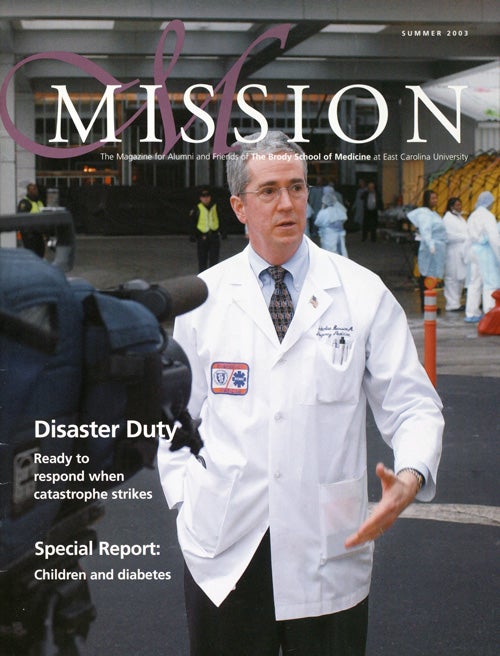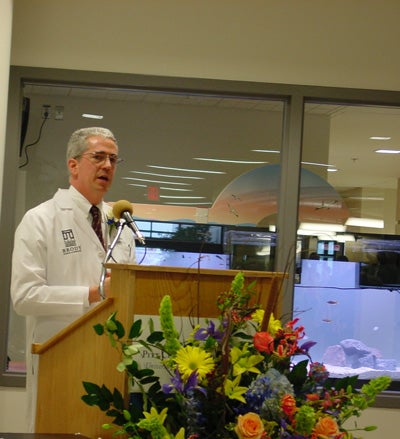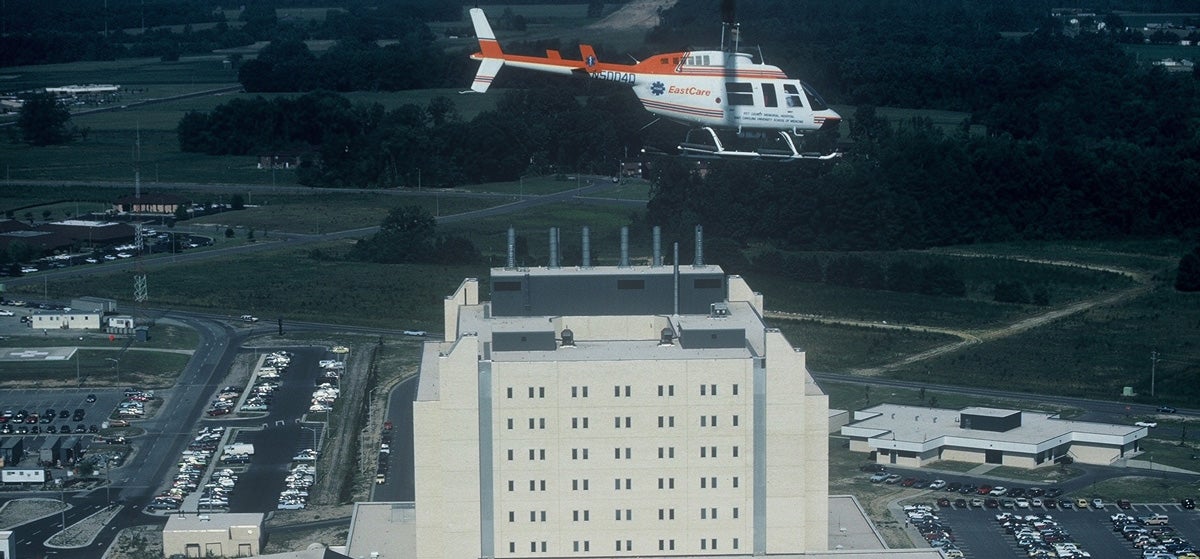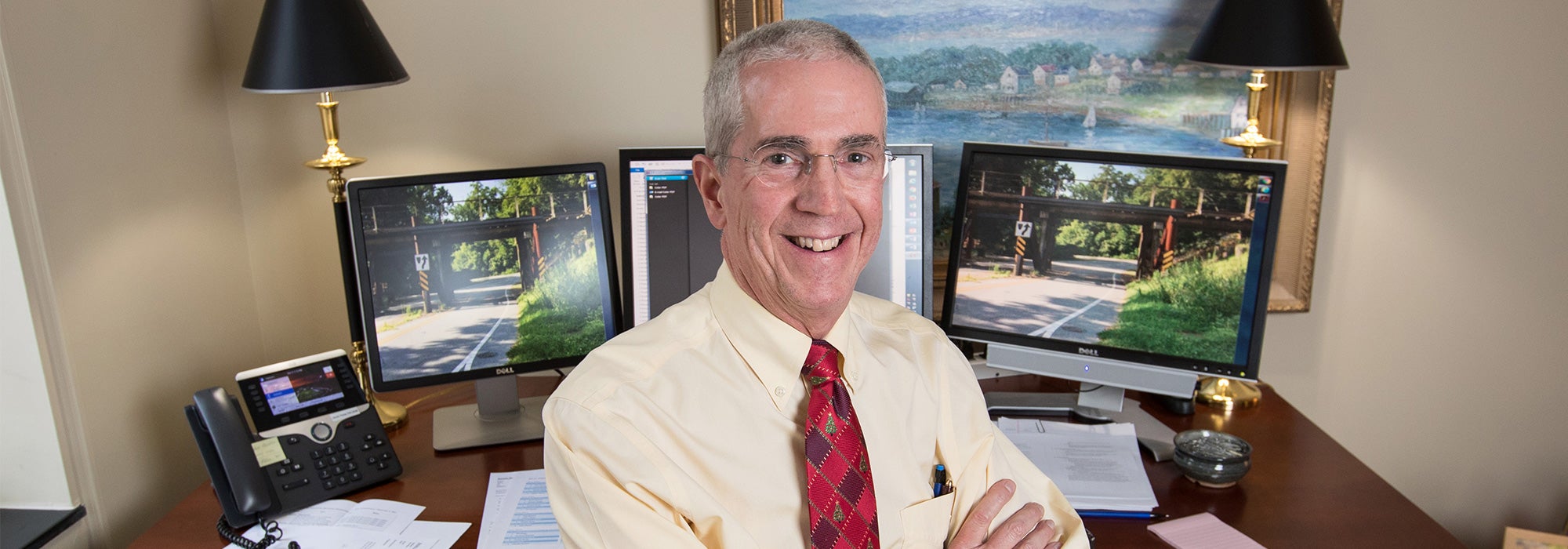A MISSION OF SERVICE
Brody’s vice dean to retire this month
A champion for quality health care in the East and a face of university leadership and service has announced his retirement from the Brody School of Medicine at ECU.
Dr. Nicholas Benson, vice dean of Brody, will retire effective Dec. 14, 2017.
Benson, named vice dean in 2007, joined the faculty at Brody in 1983. He served in many key leadership roles over his 34 years with the school, including chair of the Department of Emergency Medicine from 1994 to 2004. He has held significant roles in the dean’s office since 2004, including medical director of ECU Physicians and senior associate dean for operations. Most recently, he served as the school’s interim dean from October 2016 through August 2017.
Benson has advocated for the medical school’s mission of producing primary care physicians for the state, increased opportunities for underrepresented minorities in medical education and improved health status and access to care for citizens in eastern North Carolina.
“What I will miss are the people I worked with here,” Benson said, “and also the sense of commitment that the people who work here have for the people out there, the people of eastern North Carolina.”
The search for a vice dean is under way. Benson will remain as associate vice chancellor for health-care regulatory affairs, and to advise Brody’s dean, Dr. Mark Stacy, and other leaders for several months.
“I think of it as a decrescendo from ECU and a gentle crescendo into a professional mediation career, to work with people who are in conflict to see if I can help them resolve their issues,” he said.
The reactions of Brody and health sciences leadership to news of Benson’s retirement were punctuated with echoes of both appreciation and nostalgia.

Dr. Nicholas Benson on the cover of Mission magazine, speaking about disaster preparedness in the medical field. (Photos courtesy of PCMH Collections)
“It’s been a delight to work with such a steadfast leader for so many years,” said Dr. Phyllis Horns, vice chancellor for health sciences. “His professionalism and dedication to excellence are evident in everything he touches, and that’s known and respected by everyone,” Horns said. “He is masterful at organizing, executing and turning out great work on an unbelievably rapid timeline.”
Benson’s announcement comes as Project Unify, the integration of ECU Physicians and Vidant Medical Group, a subsidiary of Vidant Health, continues to develop. Those efforts are a move to become a national model for rural health and an academic health care delivery system for eastern North Carolina and its citizens.
“I am pleased to thank him publicly for his friendship and guidance to me as a new member of the ECU community,” Stacy said. “I will continue to seek his wisdom, and am pleased that he has agreed to stay on as an advisor. His experience as a member of the Project Unify initiative is important in determining the best fit in our evolving health care delivery capacities.”
Dr. Mike Waldrum, chief executive officer at Vidant Health, praised Benson’s dedication to rural health and the welfare of the region’s people.
“A servant leader, Dr. Benson dedicated more than 30 years to improving the health and well-being of eastern North Carolina,” he said. “His visionary leadership in higher education and health care will benefit future generations for decades to come. I wish him and his family all the best as they start a new chapter in their lives.”
A visionary for a healthier region
Known for his mild manner and expansive vocabulary, Benson, a New Jersey native, holds academic degrees from the University of Pennsylvania, the University of South Dakota School of Medicine and the Fuqua School of Business at Duke University. He completed residency training in emergency medicine at the University of Illinois Affiliated Hospitals in Chicago.
He has served in several local, regional and national leadership positions, including president of the National Association of EMS Physicians and the N.C. College of Emergency Physicians. He also served as the medical director for the N.C. Office of Emergency Services and as an oral examiner for the American Board of Emergency Medicine.
Benson arrived at Brody in 1983 from Chicago as the first residency-trained physician to join the medical school’s faculty. He knew that Greenville would be a far cry from the bright lights of the city and Chicago Cubs baseball from an apartment rooftop, but was open to new experiences in a rural setting.
“I said, ‘Let’s try it for two years,’” Benson said of conversations with his wife. “Then we said, ‘Let’s try it for another two years,’ and we’ve now completed our 17th two-year plan.”
The newness of Brody came with an air of possibility, and Benson’s colleagues were willing to step beyond the known boundaries to expand the school’s reach.
“The sense of opportunity and willingness to try new things was almost unlimited,” he said.
One priority that quickly rose to the top for Benson was to nurture the balance between educating medical students and offering quality patient care.
“The patients of eastern North Carolina depend on the faculty of this medical school very much for their health care,” Benson said. “Meeting patients’ needs and welcoming and embracing the learners and making sure that their needs are met too is definitely an art. There’s no science to that.”
In addition to cultivating a sense of academic and care-oriented excellence, Benson has overseen many landmark occurrences at Brody. Among his many accomplishments are creating and launching the EastCare air ambulance program, which now serves as a vital part of the Level I trauma program at Vidant Medical Center. He also led the planning and opening of the new emergency department, offices and rooftop helipad at Vidant.
Within the school, he has rebuilt the risk management and compliance programs, established ECU’s office of HIPAA security and created the office of clinical information technology to oversee technology integration in clinical operations.
“The work that we did to create the EastCare program remains one of my major points of pride and sorrow,” he said. “We took nurses from the emergency department and ICU, taught them some amazing skills, put them in this helicopter and created a transport program that really did make a difference for the people of eastern North Carolina.”
The sorrow, he said, stems from the 1987 crash that claimed patient and caregiver lives. The determination and resilience that grew from the tragedy, he added, became a defining point in his career.
“The courage in the face of all of that is essentially impossible to describe,” said Benson. “The rest of the team—the pilots, nurses, patients—all said, ‘It’s horrible what happened, and we grieve their loss, yet the need is still great and the work must go forward.’”

Dr. Nicholas Benson speaks at a Brody School of Medicine event.
Similar grit showed through after Hurricane Floyd in 1999 and the West Pharmaceutical explosion in Kinston in 2003.
“When unanticipated, horrendous circumstances arise like those,” Benson said, “that’s when you really see that sense of commitment, that reason why people are here, that collaborative spirit and the depth of relationships that people have for each other.”
Many of those people look back fondly on Benson’s career and their place in the medical school’s history during his tenure.
“He was a true clinical partner during many a night and weekend in our emergency department,” said Dr. Paul Cunningham, dean emeritus of the Brody School of Medicine. “We overcame many disasters together.
“He wears the purple and gold proudly. His life and work have demonstrated his long standing dedication to our mission of service to the citizens of the region. It has been nothing less than a superhuman feat that he has not only survived a number of administrations, but has clearly thrived. His anchoring focus on our mission may have been the secret to his evergreen resilience.”
To Benson, that flexibility was merely the call to serve, when and where he could.
“The deans I have worked with may have heard me say, ‘My job is to help you succeed as dean. If you succeed, then Brody is succeeding,’” he said. “What gets me out of bed in the morning is for Brody to be successful.”
His optimism and enthusiasm have been contagious to his colleagues.
“It takes very special people to commit their time and energy to the work that Dr. Benson does daily,” said Cindy Reaves, executive assistant for the vice chancellor for health sciences, who worked as Benson’s executive assistant for approximately 10 years. “He worked assiduously in the office from sunrise to sunset—sometimes past—most workdays. His drive to support the missions of Brody, the health sciences division and ECU is done with expertise, knowledge and amazing precision.”
His intuition for identifying needs and finding solutions while also respecting Brody’s history has also affected colleagues.
“The Brody School of Medicine is not a building,” said Dr. Daniel Moore, chair of physical medicine and rehabilitation. “It’s made up of people, and Dr. Benson is one of those that has been the historian for the Brody School of Medicine, but also has represented us by his mediation activity over the years. His work ethic has been impressive and it will require several new hires to replace his skill set.”
That skill set has set Benson apart over the years, said Kitty Wetherington, ECU’s interim chief Human Resources officer. Wetherington’s career at ECU spans both main campus and the health sciences campus.
“He’s been such a meaningful part of this institution for so long,” she said. “He’s an amazing friend and colleague, but he’s also just an amazing human being. He’s so willing to roll up his sleeves and do the work. He expects a lot of himself, and not any more of others than he does of himself.”
Dr. Jason Foltz, associate medical director for ECU Physicians, said that Benson serves as an example for professional standard for those around him and represents the medical school’s mission well.
“He is a strong advocate for the Brody mission and has spent over 30 years helping turn that mission into reality,” Foltz said. “As the health-care system transitions toward a focus on the value of services we provide, he has been instrumental in helping prepare Brody to remain successful in the future.”
A focus on the future
Benson, who knew at 11 years old that he would become a doctor, is clearly at ease about handing over the reins.
“It’s really incumbent for leaders, when they get to a certain stage of their career, to have the wisdom to get out of the way for the next generation of leaders,” he said. “There will always be that generation that has new ideas, new energy and new ways of doing things.”
Pairing those new ideas with the mission Brody was founded on, he said, will produce greater health care for the people of eastern North Carolina. Project Unify is a huge step in the right direction, in Benson’s mind.
“I’m very comfortable with stepping away at this point in Project Unify,” Benson said, “but I will be in the background with integration as it moves forward. In some ways, the hardest work has been done. Many people will say that there are still hard decisions and other factors to be determined, and they are right. But the sense of commitment and the true vision of leadership through our board of trustees and the Vidant board to make sure this happens is a huge part of that.”
He looks forward to seeing advances in three major areas of growth for Brody: clinical integration, expanding class size and boosting Brody’s research program.
“We have great leaders in place for all of those,” he said. “I don’t have any sense of wistfulness that I won’t be a part of that; instead, I have a sense of anticipation of being able to read about and see those things as they’re accomplished.”
Benson and his wife, Susan, will spend their time in Hillsborough, N.C., where they built a new home in 2012, taking time now to enjoy new life events together.
“It’s time for us to be together,” Benson said. “We’re somewhere between excited and jubilant about being together. It is a great opportunity to build on our relationship in wonderful ways.”

An EastCare helicopter flying near the Brody School of Medicine at ECU.
